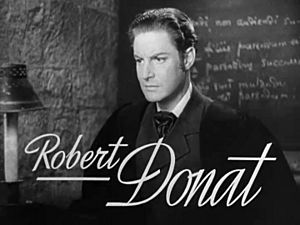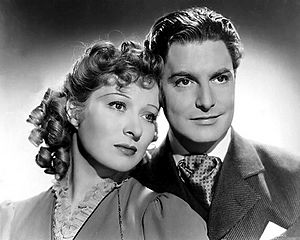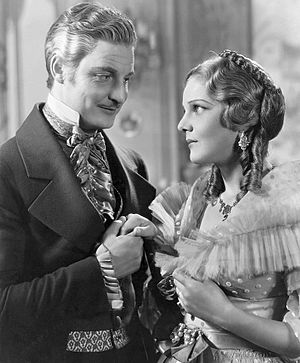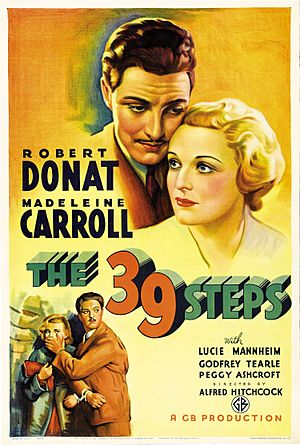Robert Donat facts for kids
Quick facts for kids
Robert Donat
|
|
|---|---|

Trailer for Goodbye, Mr. Chips (1939)
|
|
| Born |
Friedrich Robert Donat
18 March 1905 Withington, Manchester, England
|
| Died | 9 June 1958 (aged 53) London, England
|
| Occupation | Actor |
| Years active | 1921–1958 |
| Spouse(s) |
Ella Annesley
(m. 1929; div. 1946) |
| Children | 3 |
| Relatives | Peter Donat (nephew) Richard Donat (nephew) |
Friedrich Robert Donat (born March 18, 1905 – died June 9, 1958) was a famous English actor. He is best known for his roles in two classic films: The 39 Steps (1935) directed by Alfred Hitchcock, and Goodbye, Mr. Chips (1939). For his role in Goodbye, Mr. Chips, he won the Academy Award for Best Actor, which is a very important award in movies.
Many people thought Robert Donat was the top romantic leading man in British movies during the 1930s. He often played characters who were romantic dreamers or adventurous gentlemen. Donat had a long-term health problem, asthma, which made it hard for him to work a lot. Because of his asthma, he only appeared in 20 films during his career.
Contents
Early Life and Education
Robert Donat was born in Withington, Manchester, England. He was the youngest of four sons. His father, Ernst Emil Donat, was a civil engineer from Poland with German roots. Robert had a mix of English, Polish, German, and French family history. He went to Manchester Central Grammar School for Boys. His older brother, Philip Donat, was the father of actors Richard and Peter Donat.
When he was young, Robert had a bad stammer. To help with this, he took special speaking lessons called elocution lessons. His teacher was James Bernard, who was very good at teaching dramatic speaking. Robert left school at 15 and worked as Bernard's secretary to pay for his lessons.
Starting His Acting Career
Robert Donat first acted on stage in 1921 when he was 16 years old. He played a character named Lucius in the play Julius Caesar in Birmingham. His big chance came in 1924 when he joined the acting company of Sir Frank Benson, a famous Shakespearean actor. Robert stayed with Benson's company for four years. He also worked in local theatres, performing in many different plays.
In 1928, he spent a year at the Liverpool Playhouse, acting in plays by famous writers like John Galsworthy and George Bernard Shaw. The next year, he worked at the Festival Theatre in Cambridge, where he acted in and even directed some plays.
In 1929, Robert Donat married Ella Annesley Voysey. They had two sons and one daughter. They later divorced in 1946.
In 1930, Donat and his wife moved to London. He made his first London stage appearance in a play called Knave and Quean. He became well-known for his performance in a play called Saint Joan.
By 1931, he was getting noticed for his acting in plays like Precious Bane. Around this time, he was known as "screen test Donat" because he tried out for many films but didn't get the parts. However, a producer from MGM saw him on stage and offered him a role in a 1932 film, but Robert turned it down.
Becoming a Film Star
Robert Donat's first movie was a small film called Men of Tomorrow (1932). The story goes that during his screen test, he laughed naturally, and the director, Alexander Korda, was so impressed that he immediately signed him to a contract.
Korda then gave Donat the main role in That Night in London (1932). He also had an important part in Cash (1933).
His first really big movie success came with his fourth film, The Private Life of Henry VIII (1933). In this movie, he played Thomas Culpeper. The film was a huge hit around the world, and Hollywood started to notice Robert Donat.
Robert Donat made his only Hollywood film, The Count of Monte Cristo (1934). This movie was also very successful. He was offered many more roles in Hollywood, but he didn't like living in America and decided to return to Britain.
Back in England, Donat starred in Alfred Hitchcock's famous thriller The 39 Steps (1935) with Madeleine Carroll. Critics loved his performance, saying he was a great romantic comedian. One critic even compared him to American stars like Clark Gable.
Hitchcock wanted Donat for more films, but his film company wouldn't let him. Donat also turned down offers from big Hollywood studios because he preferred to work in Britain.
His next film was the comedy The Ghost Goes West (1935), directed by René Clair.
In 1937, Donat starred in Knight Without Armour. During the filming, he became very stressed and had a nervous breakdown, possibly due to his asthma. This caused delays in the movie's production.

In 1938, Donat signed a big contract with MGM British. He then starred in The Citadel (1938), playing a Scottish doctor. For this role, he received his first nomination for the Best Actor Oscar.
Robert Donat is most famous for his role as the kind school teacher in Goodbye, Mr. Chips (1939). His performance in this movie was so moving that he won the Academy Award for Best Actor. He beat out other famous actors like Clark Gable (for Gone with the Wind) and Laurence Olivier (for Wuthering Heights).
During World War II
During the early years of World War II, Robert Donat mostly focused on acting in plays. He performed in several plays at the Buxton Festival in 1939.
He also starred in the film The Young Mr. Pitt (1942) and The Adventures of Tartu (1943). From 1943 to 1945, he managed the Westminster Theatre in London, where he put on several plays. It was during this time that he started working with actress Renée Asherson, who later became his second wife.
In 1945, Donat made the film Perfect Strangers with Deborah Kerr. This was his last film for MGM British.
Later Career and Health Challenges
After the war, Donat continued to act in plays and films. In 1946, he and Renée Asherson appeared in a play called Much Ado About Nothing.
He had a small but important role as Irish leader Charles Stewart Parnell in the film Captain Boycott (1947). He also starred in the popular film The Winslow Boy (1948).
In 1949, Donat and Asherson starred in the film version of The Cure for Love. This was the only film Donat directed. His asthma made filming difficult, and his voice had to be re-recorded because of it. In this film, he used his natural accent from Manchester, which he had tried to hide earlier in his career.
Donat and Asherson also appeared in The Magic Box (1951), where Donat played William Friese-Greene, an early inventor of movies. However, his asthma continued to make it hard for him to perform.
His illness sometimes forced him to leave plays or films. For example, he had to drop out of the film Hobson's Choice (1954). Some people thought his asthma might be linked to stress and worry.
His second to last film was Lease of Life (1954), where he played a vicar who finds out he has a serious illness.
Robert Donat's final film role was in The Inn of the Sixth Happiness (1958). He played the Mandarin of Yang Cheng. His last lines in the film were very emotional. He had a stroke during filming but managed to finish the movie.
Personal Life
In 1929, Robert Donat married Ella Annesley Voysey. They had three children: Joanna, John, and Brian. They divorced in 1946. Their son, John Annesley Donat, became a photographer, actor, and writer.
On May 4, 1953, Donat married actress Renée Asherson. They lived in London but separated three years later, partly because of how severe his asthma was. They might have been close to getting back together when he passed away. Renée Asherson never remarried.
Death
Robert Donat died on June 9, 1958, in London, when he was 53 years old. He had a brain tumor and a blood clot in his brain, which was listed as the main cause of death. His body was cremated three days later.
Legacy
Robert Donat has a star on the Hollywood Walk of Fame, which honors famous people in the entertainment industry. There are also special plaques, called blue plaques, that mark places where he lived or was born in England.
Filmography
| Year | Title | Role | Notes |
|---|---|---|---|
| 1932 | That Night in London | Dick Warren | |
| 1932 | Men of Tomorrow | Julian Angell | |
| 1933 | Cash | Paul Martin | |
| 1933 | The Private Life of Henry VIII | Thomas Culpeper | |
| 1934 | The Count of Monte Cristo | Edmond Dantès, the Count | |
| 1935 | The 39 Steps | Richard Hannay | |
| 1936 | The Ghost Goes West | Murdoch Glourie / Donald Glourie | |
| 1937 | Knight Without Armour | A. J. Fothergill | |
| 1938 | The Citadel | Dr. Andrew Manson | Nominated — Academy Award for Best Actor |
| 1939 | Goodbye, Mr. Chips | Mr. Chips | Academy Award for Best Actor |
| 1942 | The Young Mr. Pitt | William Pitt / The Earl of Chatham | |
| 1943 | The Adventures of Tartu | Captain Terence Stevenson / Jan Tartu | released in the United States as Sabotage Agent |
| 1943 | The New Lot | Actor | Short, Uncredited |
| 1945 | Perfect Strangers | Robert Wilson | released in the United States as Vacation From Marriage |
| 1947 | Captain Boycott | Charles Stewart Parnell | |
| 1948 | The Winslow Boy | Sir Robert Morton | |
| 1950 | The Cure for Love | Sergeant Jack Hardacre | |
| 1951 | The Magic Box | William Friese-Greene, "the forgotten inventor of movies" | |
| 1954 | Lease of Life | Rev. William Thorne | Nominated — BAFTA Award for Best Actor in a Leading Role |
| 1958 | The Inn of the Sixth Happiness | The Mandarin of Yang Cheng | (final film role) |
See also
 In Spanish: Robert Donat para niños
In Spanish: Robert Donat para niños
 | Shirley Ann Jackson |
 | Garett Morgan |
 | J. Ernest Wilkins Jr. |
 | Elijah McCoy |



